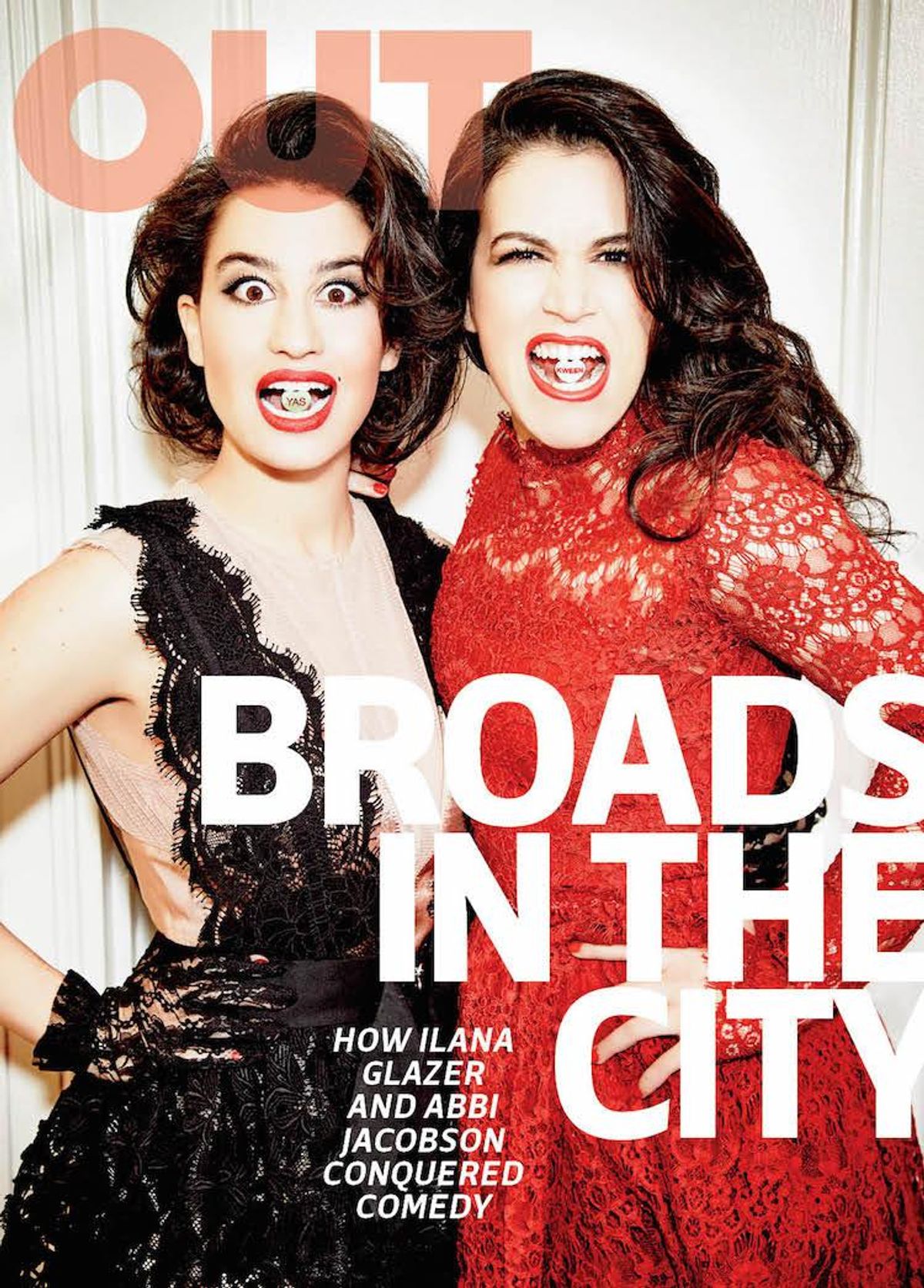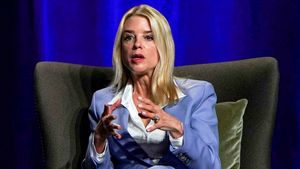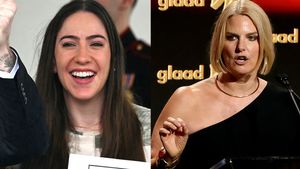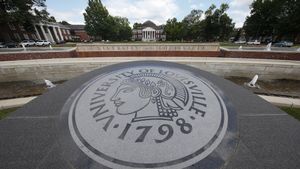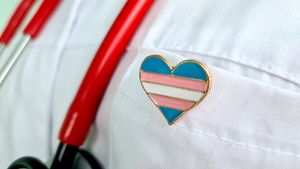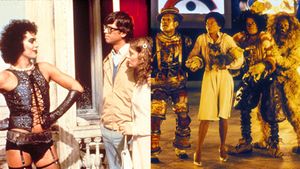Photography by Ellen von Unwerth. Styling by Grant Woolhead. Market Editor: Michael Cook. Prop Styling by Greg Garry. Hair: Peter Butler at Tracey Mattingly. Makeup: Ayami Nishimura at The Wall Group. Manicure: Maki Sakamoto at Kate Ryan Inc. Shot on location at the Waldorf Astoria Hotel, New York. Glazer: Both dressed in Lanvin.
At 8 a.m. on one of the coldest days of the winter, Ilana Glazer and Abbi Jacobson are thawing on a couch in a regal room at New York's Waldorf Astoria Hotel in midtown. The duo have just returned from Los Angeles (Glazer was shooting a miniseries, Jacobson "just working"), and now they are in the thick of promotion for the third season of Broad City, their zeitgeisty, boundary-pushing show, which is hands down the funniest, most tightly produced 25 minutes on television.
"We were in L.A. for two weeks," says Glazer, wrapping herself up in a blanket. "It was so beautiful, so warm and nice. But we also just kept being, like, 'But you miss New York, right?'"
"I got into New York at midnight, but even on the drive over I was like, Yeah, this is more me," Jacobson adds.
It's a sentiment that goes to the heart of Broad City, comedy's greatest love letter to New York since Seinfeld, in the 1990s, to which it owes some debt. Like that show, Broad City is animated by what Glazer describes as the city's "kinetic" energy in a way that makes it hard to imagine the series being filmed anywhere else. "New York doesn't stop moving," Glazer says. "The streets and avenues are veins, and all the people and the cars are blood pumping through it constantly, with a rhythm."
SLIDESHOW: Two Broads In the City
It's no coincidence that many of the show's most memorable episodes involve the two women charging through the city on some kind of harebrained quest, such as in "Coat Check," an episode late in season 2 in which Abbi undertakes to find the man who took Kelly Ripa's jacket from a coat check she was guarding. After some effort, which includes interrupting an orgy, she winds up at Ripa's apartment, initially tickled, and then increasingly horrified, as her idol proceeds to trash her popular image as America's sweetheart.
"New York is such an active, bustling, energetic place to live that the characters have to match that in a way," says Jacobson. "I think we tend to vary the movement of the show--we're either placed on a sofa or a bed, or we're sprinting somewhere."

Right from the show's origins as a web series, Glazer and Jacobson have displayed an extraordinary facility for honing great cameos out of their guests stars, but the Ripa episode was proof, if proof were needed, that Broad City had not only arrived; it had checked into the presidential suite, and ordered room service. It's hard to believe that just three years ago, no one knew Glazer or Jacobson, or the pot-smoking, sex-on-the-brain, messy but lovably devoted best friends they portray. It's also hard to believe that there was a time when two women weren't allowed to be this funny, feminist, and edgy on TV. But Glazer and Jacobson changed all that.
When the show debuted in 2014, it was viewed by some critics as the anti-Girls. According to a New Yorker profile that year, their manager pitched the series to networks as "Laverne and Shirley meets Louie." But Broad City has wriggled out of that too-tight tube top of comparison and become its own thing: a totally unhinged game changer. Now shows (like Crazy Ex-Girlfriend and Idiotsitter) are being compared to it.
Before Broad City, Glazer, 29, and Jacobson, 32, were just another two aspiring performers in the Upright Citizens Brigade--the improv school and comedy hub that has cornered the industry. They met there in 2007 and quickly established the rapport that lies at the core of their comic alchemy. Frustrated with the lack of material they were getting at UCB, they created their web series of the same name in late 2009. They took it seriously, meeting every day for writing sessions, and releasing a new episode every week. For their second "season," they juggled writing, acting, and hiring directors and editors.
Glazer: Hiring is a relative term.
Jacobson: Yes. Second season we, like, hired them for $100! It's as if we hired them in bitcoins. Or bagels.
Glazer: We, like, paid them like it was the early '70s.
Jacobson: It was a lot of money for us at the time.
For the web series finale, Glazer and Jacobson secured Amy Poehler for a cameo, and soon after Poehler agreed to sign on as executive producer as they pitched the concept to the networks, eventually clinching a deal with Comedy Central. It's one of the great examples of a web show making the transition to television. "The web completely changed the game," says Jacobson. "It's a different world."
Broad City captures contemporary New York the way other shows have tried hard to ever since Sex and the City ended, but with a much greater sense of mischief. The characters rush around the streets, from their dead-end jobs to pretentious art galleries to food co-ops to a line for a churon (the newest food craze: a mix of a churro and a macaron) in a frenetic fizz that makes the series feel like a goofy Great American Race.
Women's representation in comedy has made stellar advances over the past five years. Poehler, Tina Fey, Mindy Kaling, Lena Dunham, Amy Schumer, and Glazer and Jacobson are all candid, over-the-top, bold but vulnerable, and sex-positive--the kind of women gay men tend to relate to because their lives seem to mirror our own. Also, if there's one thing we love, it's a sloppy, self-deprecating broad.
SLIDESHOW: Two Broads In the City
Still, many representations of female sexuality on TV can look forced. Glazer and Jacobson get away with so much (dildos, three-ways, making out with minors) because they strive to keep their high jinks shame-free. Also, there is zero sexual competition between the two characters. They remain friends first. "It's like these girls are horny but not under the male gaze," says Glazer. "They're horny, period. Just starting from the vagina, not starting from some man looking at them."

That, yes, but also their sexuality comes from a refreshingly natural place, without caveats or agendas. Glazer credits Poehler for that. She is the one, Glazer says, "who gave us permission to have that agency over the sexual politics of the show."
But all that sexual effortlessness takes work. The two spend hours refining their scripts. Last season's infamous "pegging" episode, in which Abbi's lover (her across-the-hall neighbor) asks her to screw him with a strap-on dildo, took many drafts to get right. "We were so back and forth," says Glazer. "We just didn't want the pegging to be the joke. We were so delicate about it." Jacobson concurs. "We just wanted to make sure it was very clear we were not, like, 'Pegging's crazy!' It was more about the specificity of needing this one Etsy dildo!"
The hard work paid off. That particular episode has been a high-water mark for the show. And it encouraged many fans--many straight men--to open up sexually, so to speak.
"I recently had a conversation about it with a dude I was on a date with," says Jacobson. "He was like, 'I need to tell you that as a straight dude I had this whole come-to-Jesus moment watching your pegging episode. At first I was like, Why am I reacting negatively to this? And it made me think, and it made me realize this is some sort of thing ingrained in me for no reason, and why should I not try something like that? Like, why would I not be open to that--because it has some sort of gay connotation?' I just sat back, and I was like, Are you trying to ask me to peg you? It was the biggest compliment."
Indeed, the show breaks ground with its brash, no-apologies sexuality--you can't get through an episode without seeing some kind of phallic imagery. And when the sex isn't hilariously awkward (Abbi and Seth Rogen battle swamp butt before they go at it), it's still fun and female-centered (there should be a drinking contest based on how many times Ilana says she's wet). Add to that the fact that Ilana's biggest catchphrase--she's given "Yas, kween" a home in the mainstream--is lifted from black and queer culture. (It helps that Glazer's brother, Eliot, and her roommate, BuzzFeed writer Matt Stopera, are both gay.) Overall, Ilana's sexual fluidity (and Abbi's attempts at it) make this perhaps the queerest show on TV right now.
Glazer:It's a privilege that we get to be this fluid. Also, women's sexuality--women's queerdom--is much less threatening to the mainstream than men's.
Jacobson:It shouldn't be.
Glazer: But I think straight men are uncomfortable, thinking that their dicks might quiver if they're watching a gay dude.
Jacobson: I think when people watch it, they're like, "What's the deal?" [with the sexual ambiguity] but it shouldn't be a deal. It's like, why can't anyone hook up with whoever they want?
Glazer: When we were pitching, Amy was like, "Everyone under 30 is gay," but this was, like, five years ago. Now I think everyone under 40 is gay or fluid--the mentality is different. It's cool that this show is marking time.
If anything makes a fitting comparison to Broad City, it's another iconic show with a big gay following: Absolutely Fabulous. Both celebrate and skewer the pretentiousness, freneticism, and elitism of modern urban life, taking it to absurd, farcical new heights. In season 3's first episode, for example, the sample sale Abbi and Ilana experience is not just competitive--shoppers are literally in battle, clawing at each other. (Also, like Ab Fab's Edina and Patsy, Abbi and Ilana are wasted half the time.) When, in that same episode, an affected artist describes Abbi's artwork to Ilana as, "so surreal, but at the same time...so real....so surreal, but...just so real," it seems like a reference to the show itself. Mixing high satire with honest characters to comment on our insanely trend-driven culture, Broad City is so real it's surreal.
Like the past two seasons, the new one has major cameos including Vanessa Williams, Whoopi Goldberg, and Hillary Clinton.
"We had decided that we didn't necessarily need Hillary to be in the episode, so we went ahead and wrote it, and then we were like, Fuck it, let's just ask her," says Jacobson. "We tried through various sources--one of our execs at Comedy Central had worked on her campaign, and obviously Amy Poehler has portrayed her--and she said yes, which was huge."
The broads don't hold back, but the series will display hints of maturity. Glazer and Jacobson have grown as actors, and the new season stretches them into new territory (there's even a kind-of-serious episode). "There are more character arcs this season," says Jacobson. "And big changes, especially for Ilana. As we move forward, we're going to do more of that. Because in seasons 1 and 2, we didn't really have that. It's interesting, as we get older, the characters age much slower than we do."
As the two continue diverging further and further from their alter egos, the show is also becoming harder to create. Being a cultural touchstone is not easy. There's more at stake, the writing is more difficult, and their stratospheric rise can be enervating. At the same time, they feel themselves reaching new levels as they learn new things about themselves and each other.
Glazer:First season, it was like a baby. It was like this fresh, exciting baby. Second season, it was like, This is a big-kid kid, like a big-kid Wendy's meal. Third season, it felt angsty and adolescent. We were, like, grossed out.
Jacobson:We had had space to process the show for the first time. So it was harder to write it.
Glazer:It was just so hard, but I remember thinking during writing, This is me feeling my brain grow.
Jacobson: We're learning exponentially as we go--at a crazy rate. We both really lucked out in having found each other and just gone with it.
Glazer: I'm not like a conventionally romantic person, but I think our experience is the most romantic I could ever be, where it's like--
Jacobson:--love at first sight.
Glazer: Yeah, the promise of something, thinking something's going to be there. We got married, you know what I mean? I'm like, Oh, I get it when people do it in a conventional sense. You believe that you can build something.
Jacobson: It is like that because we are now better than ever.
Glazer:And there's a synergy--people get married and have kids. And talk about the potential of fucking kids! That's what this show is. It's inside two separate people at first.
Jacobson:And in each part of the process--the writing, the actual production, the acting, the editing, even in interviews--we have found our strengths and weaknesses, and often where each of our weaknesses lie, the strengths of the other come through.
Glazer: And being able to recognize a weakness is so much easier when I have this brilliant partner who I know can pick up the slack in an area I'm weak in--and that's a strength in itself. It's fucking fabulous.
SLIDESHOW: Two Broads In the City

Even before season 3 began to air, Comedy Central had greenlit seasons 4 and 5, which Jacobson and Glazer will start writing over the summer, after a much-needed break.
"It takes a year for us to make a season," says Jacobson. "And we're getting farther and farther away from being early 20-somethings." For Glazer, the boundaries between her character and her off-screen self are becoming clearer--and more distinctive. "The characters are becoming more representative of other people and more ideas," she says. While their own lives are changing at record speed, they still aren't sure how much "Ilana" and "Abbi" will change.
Glazer:I think we're doing both, actually.
Jacobson:Yeah, we're changing and not at all. Which is what I think people actually do. They change, but at the core they don't really.
Glazer:Which is happening in real life too. We're best friends and business partners, and we keep laughing at each other about the same things that we used to.
Jacobson:But we're very different.
Glazer:The shit around us is changing so much.
One thing will remain constant, though--their friendship.
Glazer:We were talking about how we find our friends sexy. The hottest people to me are my friends, for sure. That's, like, why I'm around them so much. They're, like, the hottest, coolest people. I think it's part of that fluidity--it's OK to feel that way about your friends and it's OK to have that energy also.
But as intimate as the characters are with each other, they will probably not be hooking up in the series, no matter how drunk and stoned they get.
Glazer:If they hooked up, would it be for us, or for the male gaze?
Jacobson:Are people watching this, waiting for us to have a sex scene? That's not what this is about.
Glazer:I was just reading this article in which Lena [Dunham] interviewed Gloria Steinem. There was this awesome quote where Gloria said that your old lovers become some of your closest friends. And I find that too. And I like that all that can exist in the same space: sexual, romantic, friendly feelings. That's sexual fluidity to me.
SLIDESHOW: Two Broads In the City
